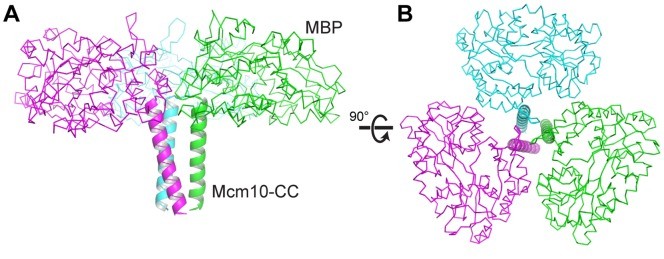Fusion Protein-Assisted Crystallization
Protein crystallization is essential in structural biology for determining protein structures. However, protein crystallization can be challenging due to factors such as low solubility, poor stability, and aggregation of target proteins. To overcome these obstacles, fusion proteins, particularly those incorporating maltose-binding protein (MBP), have become valuable tools in protein crystallization. Creative Biostructure is committed to providing high-quality solutions in the field of protein crystallization, helping customers overcome challenges through MBP fusion proteins.
Key Benefits of MBP Fusion Protein Crystallization
Fusion proteins are engineered constructs that combine the target protein with an additional protein or peptide. In the context of protein crystallization, fusion proteins can be designed by fusing the target protein to MBP. MBP is a soluble and stable protein that acts as a carrier or tag, providing several advantages for protein crystallization, such as:
- Enhanced Solubility and Stability: MBP has excellent solubility and stability characteristics. By fusing the target protein with MBP, the solubility and stability of the fusion protein can be improved. This is particularly beneficial for proteins that exhibit poor solubility or are prone to aggregation.
- Facilitated Purification: MBP possesses a natural affinity for maltose or related sugars. This property can be exploited to purify fusion proteins using affinity chromatography. The fusion protein can be selectively bound to a maltose resin and subsequently eluted, resulting in a highly purified protein sample for crystallization experiments.
- Expression and Folding Assistance: MBP can assist in the correct folding and expression of fusion proteins. It acts as a chaperone, promoting the proper folding and preventing misfolding or aggregation during protein expression and purification processes. This ensures that the fusion protein is in a suitable conformation for successful crystallization.
- Increased Crystallization Success: The presence of MBP in fusion proteins has been shown to increase the success rate of protein crystallization experiments. MBP can act as a crystallization chaperone, enhancing the nucleation and growth of protein crystals and improving the quality of the resulting crystals.
By leveraging the benefits of fusion proteins incorporating MBP, researchers can overcome challenges associated with protein solubility, stability, and aggregation, ultimately leading to successful protein crystallization. The presence of MBP in the fusion protein provides advantages throughout the entire process, from expression and purification to the formation of high-quality protein crystals suitable for structural analysis.
 Figure 1. Crystal structure of the MBP-CC asymmetric unit, with each protomer colored differently. Maltose-binding protein is shown as a Cα-trace, and the xMcm10 coiled-coil is depicted as a cartoon ribbon. (Du W, et al., 2013).
Figure 1. Crystal structure of the MBP-CC asymmetric unit, with each protomer colored differently. Maltose-binding protein is shown as a Cα-trace, and the xMcm10 coiled-coil is depicted as a cartoon ribbon. (Du W, et al., 2013).
Our Capabilities for Advancing Protein Crystallization
Creative Biostructure provides a comprehensive suite of services to tackle the complexities of protein crystallization. Our innovative approach, utilizing fusion proteins—particularly MBP fusion proteins—offers significant advantages in these studies. Here are some of our key capabilities:
- Fusion Protein Design: Our experienced scientists have expertise in designing fusion proteins tailored to your specific requirements. We can analyze the properties of your target protein and select appropriate fusion partners, such as maltose-binding protein, to enhance solubility, stability, and crystallization potential.
- Protein Expression and Purification: We have extensive proficiency in recombinant protein expression and purification techniques. Our team utilizes various expression systems, including bacterial, yeast, insect, and mammalian cells, to produce the fusion protein of interest. We optimize expression conditions to achieve high yields and maintain protein quality. Purification methods, such as affinity chromatography using MBP tags, are employed to obtain highly pure fusion proteins.
- Crystallization Screening: We perform comprehensive crystallization screening using a diverse range of commercially available and in-house-developed crystallization screens. Our experts carefully optimize crystallization conditions, including pH, temperature, precipitant concentration, and additives, to promote crystal formation and growth.
- Crystallization Optimization: If initial screening yields suboptimal crystals or no crystals at all, we employ advanced strategies for crystallization optimization. This may involve fine-tuning crystallization conditions, protein modifications, or the use of alternative fusion partners or additives to improve crystal quality and size.
Why Choose Creative Biostructure?
We have several unique advantages that make us a leader in the field of fusion protein-assisted protein crystallization. These strengths include:
- Our team consists of highly skilled scientists with extensive knowledge in protein expression, purification, and crystallization technologies.
- We work closely with clients to design fusion protein strategies that align with specific research goals and requirements, providing personalized support throughout the process.
- Our laboratories are equipped with advanced instrumentation and techniques for protein expression, purification, and crystallization.
- In addition to fusion protein-assisted crystallization, we offer a wide range of complementary services, including protein engineering, structural biology, X-ray crystallography, and cryo-electron microscopy (cryo-EM). This comprehensive portfolio allows us to provide integrated solutions and support your research needs at all stages.
- We prioritize open communication and collaboration, building long-term partnerships based on trust and a commitment to scientific excellence.
 Figure 2. Our advantages of fusion protein-assisted protein crystallization. (Creative Biostructure)
Figure 2. Our advantages of fusion protein-assisted protein crystallization. (Creative Biostructure)
Frequently Asked Questions
-
What types of samples are required for successful protein crystallization?
High-quality, pure, and soluble target proteins are required. Additionally, suitable expression vectors and compatible buffers are necessary for successful protein crystallization.
-
How long does the protein crystallization process take?
The duration of the process varies depending on factors such as protein complexity and crystallization conditions. Initial screenings typically take a few weeks, with optimization phases extending the timeline if necessary.
-
Can you customize the fusion protein constructs to meet specific requirements of different target proteins?
Yes, our scientists can tailor fusion protein constructs to match the specific requirements of your target protein. By analyzing the target protein's properties, we select appropriate fusion partners like MBP to enhance solubility, stability, and crystallization outcomes. Customizations may include varying the fusion protein's length, incorporating specific tags for purification, and adjusting expression conditions to ensure optimal results.
For further information or to discuss your specific research needs, contact us today. Our team is dedicated to supporting your scientific endeavors with expertise and innovative solutions.
Ordering Process
References
- Du W, Josephrajan A, Adhikary S, et al. Mcm10 self-association is mediated by an N-terminal coiled-coil domain. PLoS One. 2013. 8(7): e70518.
- Jin T, Chuenchor W, Jiang J, et al. Design of an expression system to enhance MBP-mediated crystallization. Scientific Reports. 2017, 7(1): 40991.
